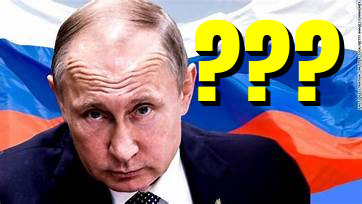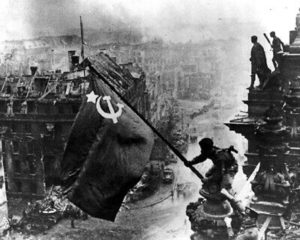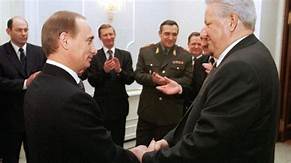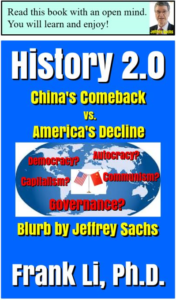Russia is in the news big time these days (2022 Russian invasion of Ukraine). So, there is no better time than now for me to write about Russia …
Although I have lived in China, Japan, America, and western Europe, and traveled around the world, I have never been to Russia. However, I believe my life experience in both the East and the West has given me a unique perspective of many things, including Russia.
I spent my first 23 years (1959-1982) in China. Throughout my teenage years, I had never heard of any Western authors like Charles Dickens or Mark Twain. Instead, I was exposed to several Russian authors like Boris Pasternak (for Doctor Zhivago) and Leo Tolstoy (for Anna Karenina). In China back then, virtually everything foreign came from the USSR, including communism and several fantastic movies, such as Lenin in 1918 and The Battle of Stalingrad. Oh, I did know Tchaikovsky (for Swan Lake). Of course, I did not know the existence of Gulag.
I left China in 1982 and have since been immersing myself in Western cultures. In 2008, I started my journey on writing, with a niche in the intersection between the East and the West. For a broader understanding, I took a closer look at Russia, from the Western perspective this time, complementing my early exposure in the East …
1. Russia’s history: a brief overview
For practical purposes, I will divide Russia’s history into four periods as follows:
- 0001–1917: Ancient times and the Russian Empire
- 1917–1945: The USSR and WWII
- 1945–1991: The Cold War
- 1991–Present: Modern Russia.
Let me elaborate on each …
1.1 0001–1917: Ancient times and the Russian Empire
Why is Russia so vast geographically, spreading over 11 time zones?
Russia grabbed a lot of land from its neighbors, including China. For example, the First Sino-Russian War happened from 1690 to 1693. China lost the war and quite a big piece of her territory.
The term Russian Empire refers to Russia from 1721 to 1917, during which Russia fought with foreigners in a major way at least three times as follows:
- French invasion of Russia: Russia defeated the mighty Napoleon.
- Second Sino-Russian War (1854-1855): China lost again, with more land lost to Russia.
- WWI: Russia played a major role and contributed to the Allies’ victory.
The Russian Empire was ended by the October Revolution in 1917, when the Bolsheviks, led by Vladimir Lenin, seized power.
1.2 1917–1945: The USSR and WWII
After the October Revolution, a civil war erupted between the “Red” (Bolshevik) and “White” (anti-Bolshevik) factions, which continued for several years, with the Bolsheviks ultimately victorious. As a result, the USSR (Union of Soviet Socialist Republics) was born in 1922.
The USSR was the first self-proclaimed “socialist” country in the world, theoretically backed up by Marxism and Leninism. In the West, it was labeled as “communism”.
Many bad things happened in the USSR, but its contribution to WWII must not be marginalized. As a matter of fact, it was the USSR, not the West, that decisively defeated Nazi Germany.
Oh, the USSR, as well as America, also helped China defeat the Japanese to end WWII in China. Every Chinese must be grateful for that.
1.3 1945–1991: The Cold War
The Cold War officially started right after WWII, with the USSR leading the East and America leading the West. The West won in 1991, when the USSR disintegrated into Russia and several so-called “former Soviet republics”, including Ukraine and Georgia.
How did the West win the Cold War over the East?
The economic might of capitalism over socialism won, not democracy over communism. For more, read History 2.0 – China’s Comeback vs. America’s Decline.
1.4 1991–Present: Modern Russia
Russia changed too quickly after 1991 – It adopted both a new political system (i.e., democracy) and a new economic system (i.e., capitalism) overnight. The results were chaos and misery, to say the least.
Russia has been trying to come back, under the strong leadership of President Putin.
2. Communism in Russia
Although communism was theorized by Karl Marx some 150 years ago, it was Vladimir Lenin who first made it a reality in Russia in 1917.
Overall, communism did well in Russia for a few decades, with some remarkable achievements. Two examples:
- All of the USSR was mobilized to decisively defeat Nazi Germany in WWII.
- With the help from Hitler’s rocket scientists captured at the end of WWII, the USSR led the Space Race with Sputnik_1 in 1957 and the first human in space (Yuri Gagarin) in 1961. Both were a few years ahead of mighty America.
However, the USSR eventually proved to be no match against America for one key reason: “It’s the economy, stupid!”
Specifically, here is the simple truth about communism (in Russia and China):
Communism in Russia was officially dead by 1991, when the USSR ceased to exist, thanks to Mikhail Gorbachev. In total, Russian communism lasted for 74 years (1917-1991).
3. Democracy in Russia
Russia quickly adopted democracy after communism, thanks to Mikhail Gorbachev, a brainless and reckless leader, and Boris Yeltsin, a heartless and reckless leader. It was very devastating to Russia, adding salt (democracy) to the deep wounds caused by communism. The results were untold human misery, a few billionaires (e.g., Mikhail Prokhorov), and a doubtful future.
Vladimir Putin, a 46-year-old man, succeeded Yeltsin in 1998. He has proven to be great for Russia. President Putin, through his first two terms (five year/term), restored some order in Russia and set Russia on the path to success …
Look at Russia’s top leaders since 1917, two points stand out:
- From Vladimir Lenin, followed by Joseph Stalin, and all the way to Boris Yeltsin, little nepotism was found. They were all self-made men, politically – Putin was no exception.
- After Stalin, nobody in his 40s became a Russian top leader, until Putin.
So, Putin must be very good at politics, then and now. More importantly, Putin used his youthfulness to benefit Russia as well as himself. After his two terms as the President, Putin served as the Prime Minister for one term and was re-elected as the President. He has been on that job since then, with no end in sight.
Today, President Putin has proven to be even wiser than he was throughout his first two terms as the President.
4. President Putin
You can’t understand modern Russia, without a good understanding of President Putin. Unfortunately, America’s media is not doing a good job for that, often vilifying him. Let me highlight three points:
- Putin is a dictator.
- He was a KGB guy.
- Putin wants to resurrect Russia’s past glory.
Let me elaborate on each …
4.1 Putin is a dictator
America’s MPC (Media-Political Complex) often portrays Putin as a dictator, under a thin disguise of democracy. It is basically false in view of Russia. Two main reasons:
- Vladimir Putin is actually the least authoritarian Russian leader over the past 100 years, except for his protégé and puppet President Dmitry Medvedev.
- Putin is a strong leader. Is there anything wrong with a strong President?
4.2 Putin was a KGB guy
Putin’s career in KGB appears to have better prepared him for the top job in Russia than did Obama’s career in community organizing or Trump’s career as a host of a reality TV show in America. Besides, what’s wrong with being a former KGB guy? China’s Deng Xiaoping was a bloody communist before becoming the greatest peaceful transformational leader in human history.
4.3 Putin wants to resurrect Russia’s past glory
Below is an excerpt from a typical American article (Power Delusions: U.S., Russia Face Off Over Ukraine):
What’s wrong with a leader trying to resurrect his country to its past glory?
China has been working hard to resurrect its own past glory.
Don’t we Americans want to retain our glory, and resurrect it if we lose it?
5. Discussion
Russia is a great country and Russians are a great people, having overcome huge obstacles, with their incredible history and culture.
All signs indicate that President Putin is heading toward historic greatness in Russia. Will that be good enough to save Russia from two consecutive disasters (i.e., communism and democracy)?
Time will tell.
Will Putin ever match China’s Deng in historic greatness?
No!
Here is why: Aside from the fact that communism had lasted a lot longer (i.e., causing more damage) in Russia (1917-1991) than in China (1949-1976), Putin has democracy in his way, while Deng did not. Yes, democracy is self-destructive – It is failing in Russia just as it is failing in America.
A critical point: No foreigner should ever underestimate Russia. Three main reasons:
- No foreign country, except for the Mongol Empire, has ever conquered Russia militarily, not even the mighty Napoleon or Nazi Germany. As a matter of fact, both were humbled in Russia. So, think 10 times before messing with Russia.
- Russia is a vast country with a lot of natural resources. This means Russia can afford to make a lot more mistakes than any other country on earth, including America. Yes, communism was a mistake. So, too, is democracy. However, Russia seems to have realized the shortfalls of democracy, especially after viewing China’s success without it.
- Don’t mess with nuclear Russia!
Finally, on this Ukraine-Russia thing, below is my prediction:
What, then, is NATO?
NATO is a new Nazi!
Any doubt?
Ask the folks in Iraq, Afghan, Libya, and Syria!
Russia will end NATO, just like it did with Nazis! Two informative readings:
6. Closing
Growing up in communist China, I have great sympathy for Russia for being hit hard twice: first communism and then democracy.
Hopefully, this post has helped you, especially my fellow Americans, better understand Russia.
For a more robust understanding of Russia, as well as the world, read my new book: History 2.0 – China’s Comeback vs. America’s Decline …
Now, please sit back and enjoy the video below.






